七年级英语上册Unit5DoyouhaveasoccerballTheThirdPeriodSectionB1a_1d课件新版人教新目标版
人教版七年级上册英语Unit 5 Do you have a soccer ball
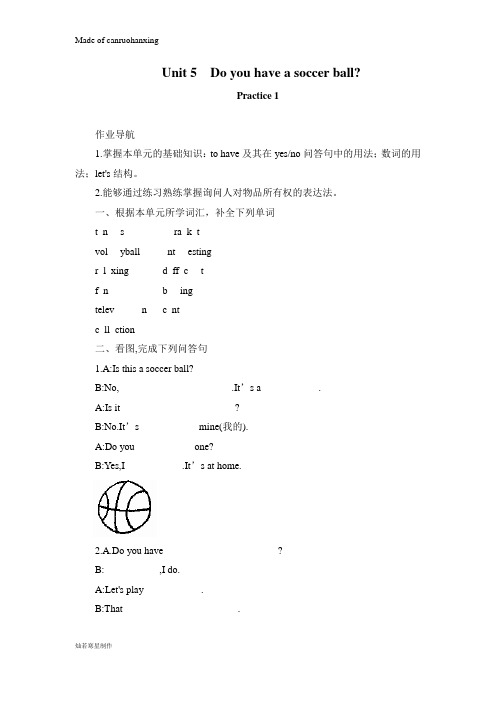
Unit 5 Do you have a soccer ball?Practice 1作业导航1.掌握本单元的基础知识:to have及其在yes/no问答句中的用法;数词的用法;let's2.能够通过练习熟练掌握询问人对物品所有权的表达法。
t_n_ _s ra_k_tvol_ _yball _nt_ _estingr_l_xing d_ff_c_ _tf_n b_ _ingtelev_ _ _ _n c_nt_ _c_ll_ction二、看图,1.A:Is this a soccer ball?B:No,___________ ___________.It’s a ___________.A:Is it ___________ ___________?B:No.It’s ___________ mine(我的).A:Do you ___________ one?B:Yes,I ___________.It’s at home.2.A.Do you have ___________ ___________?B:___________,I do.A:Let's play ___________.B:That ___________ ___________.3.A:___________ you have ___________ ___________?B:No,I don't.A:___________ ___________ ___________ ___________ ______________________ then?B:Yes,I do.A:Let's play ___________.B:That sounds interesting.4.看下图,仿照对话3A:___________________________________B:___________________________________A:___________________________________B:___________________________________A:___________________________________B:___________________________________1.fun_________2.interesting _________3.relaxing _________4.boring _________5.difficult ___________A BC D EWhat's on,volleyball,play,has,bat,tennis,How do you,difficult1.Math can be ___________.2.___________television?3.Does Rick have a___________racket?4.Does your brother ___________ a soccer?五、连词组句(请注意大小写和标点符号)1.she,does,a volleyball,have___________________________________2.don't,they,a soccer ball,have___________________________________3.sports,you,do,like___________________________________4.every day,Sue,sports,plays___________________________________puter games,play,let's,sounds,that,interesting___________________________________1.A:What's this in English?B:It's ___________ ___________.A:And what are these?B:They are ___________.2.A:What's that in English?B:It's ___________ ___________.A:And what are those?Are those buses?B:No,___________ ___________.They are ___________.3.A:What's that in English?B:It's ___________ ___________.A:And what are those?B:___________ ___________ oranges.4.A:What's that in English?B:It's ___________ ___________.A:Are those eggs?B:Yes,___________ ___________.参考答案一、tennis racket volleyball interesting relaxing difficult fun boringtelevision center collection二、1.B:it isn’t, basketball A:your basketball B:not A:have B:do2.A:a baseball B:Yes A:baseball B:sounds interesting3.A:Do, a volleyball A:Do you have a tennis ball A:tennis4.A:Do you have a basketball? B:No, I don’t. A:Do you have a baseballthen?B:Yes, I do.A:Let’s play baseball. B:That sounds interesting.三、1.C 2.B 3.D 4.E 5.A四、1.difficult 2.What's on 3.tennis 4.have五、1.Does she have a volleyball?2.They don’t have a soccer ball.3.Do you like sports?4.Sue plays sports every day.5.Let’s play computer games.That sounds interesting.六、1.B:a book B:books2.B:a car B:it isn't;cars3.B:an orange B:They are4.B:an egg B:they are。
新素质方略七年级英语上册Unit5Doyouhaveasoccerball
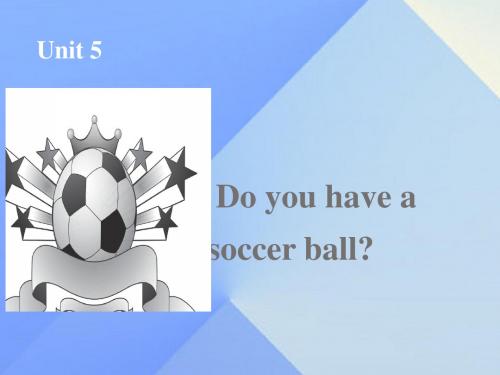
B. 本题考查的是实义动词一般疑问句,由于主语是you,此处只能用do.
Words
soccer n.
名词,意为“(英式)足球”。也可以说soccer ball。
Expressions
小练习:单项选择
-Let’s play volleyball! -.
A. Thank you
B. Yes, please
C. That sounds good. D. That sound good.
C. A、B不符合题意,C 、D两项sound的形式能与主语that相对 应的是C
get to意为“到达”,get down意为“下来;落下”,get up意为“起床”,只有B项 get on
with sb意为“与某人相处”。因此选B。
Expand
真题演练
3.______your friends have a wonderful journey?
A. Are
B. Is
C. Do
Translations
Helen: Bill has it. 海伦:比尔有。 Cindy: Oh, yeah. And do you have your jacket? 辛蒂:哦,好的。那你穿你的夹克吗? Helen: Oh, no, I don’t. It’s on the chair. Let me get it. 海伦:噢,不,我没有。它是在椅子上。让我去取吧。 Cindy: And your hat, too! 辛迪:还有你的帽子! Helen: OK, I have my jacket and hat. Let’s go. 海伦:嗯,我拿了我的夹克和帽子。我们走吧。
七年级英语上册(人教新目标版) Unit 5 Do you have a soccer ball

1. have作动词,意为“有”,一般指某人拥有某物, 侧重于所属关系。其第三人称单数形式是has。 常用句式为:某人 + have/has + 某物,表示“某人 有某物”。 在一般现在时态中,当主语为第三人称单数形式时, 用has的形式。
பைடு நூலகம்
2. late “迟到” 是个形容词,常用be late的结构。
We have a new soccer ball.
4. us“我们”, 是we的宾格形式,在句子 中放在介词或动词后作宾语。 【辨析】we / us / our we“我们”是人称代词主格形式,作句 子的主语。 us“我们”是人称代词宾格形式,作句 子的宾语。 our “我们的”是形容词性物主代词, 放在名词前。
反击式破碎机 /
不勒死也会被野狼吃了。樟树旁,一棵叶片差不多掉光的板栗树,尽管它算是板栗树里面的粗壮者,但长在这里,只能映衬古樟的茕茕孑立和翠绿葱茂。,
二 我们的林班在一个小沟塘里
A: Do you have a soccer ball? B: Yes. I do. A: Where is the soccer ball? B: It’s on the floor.
母亲说,孩子你太傻了,你上当了,这副银镯子得换好几个馍呐,再说呢,你怎么可以把姥姥送给你的纪念品随便送人呢?你姥姥若知道了会伤心会生气的。据说他是中过风的人,现在恢复得差不多。比如,生产队耕翻后的地瓜地啊,有时 会散落极少数小地瓜或破损的地瓜及地瓜根茎露在上面,一般来说耕地人会先捡拾一遍,可个别还有遗漏的啊。
【练习】翻译下列句子
1) It’s never too late to stop smoking. 戒烟何时都不算晚。
2) She’s late for work every day. 她每天上班都迟到。
七年级英语上册 Unit 5 Do you have a soccer ball(单词+重点句型)语法解析
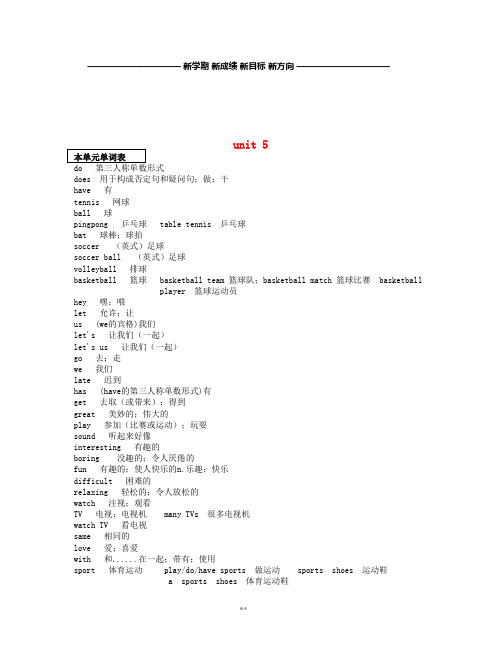
——————————新学期新成绩新目标新方向——————————unit 5does 用于构成否定句和疑问句;做;干have 有tennis 网球ball 球pingpong 乒乓球 table tennis 乒乓球bat 球棒;球拍soccer (英式)足球soccer ball (英式)足球volleyball 排球basketball 篮球 basketball team 篮球队;basketball match 篮球比赛 basketball player 篮球运动员hey 嘿;喂let 允许;让us (we的宾格)我们let's 让我们(一起)let's us 让我们(一起)go 去;走we 我们late 迟到has (have的第三人称单数形式)有get 去取(或带来);得到great 美妙的;伟大的play 参加(比赛或运动);玩耍sound 听起来好像interesting 有趣的boring 没趣的;令人厌倦的fun 有趣的;使人快乐的n.乐趣;快乐difficult 困难的relaxing 轻松的;令人放松的watch 注视;观看TV 电视;电视机 many TVs 很多电视机watch TV 看电视same 相同的love 爱;喜爱with 和......在一起;带有;使用sport 体育运动 play/do/have sports 做运动 sports shoes 运动鞋a sports shoes 体育运动鞋them (they的宾格)他(她、它)们only 只;仅like 喜欢;喜爱easy 容易的;不费力的after 在......以后class 班级;课(近义词:lessen);等级;类别;阶段classmate 同班同学 roommate 室友 workmate 同事 deskmate 同桌schoolmate 校友Bill 比尔(男名)on的用法,详见unit4【解析】on可以表示“通过;使用……方式”,后面通常接表示通信工具的名词。
新目标英语七年级上册_unit_5_Do_you_have_a_soccer_ball B

let sb. do sth让某人做某事
Grammar Focus:
Do you have a baseball?
Yes, I do./ No, I don't. I have a volleyball.
Do you have a ping-pong bat?
where's=where is ,对地点提问,后接单数名词。
Let's 是 let us的缩写。 let’s包括说话人在内,let us不包括说话人在内。 本句是以let开头的祈使句,结构为“Let’s do sth.”, 意为“咱们……吧”,常用于提出建议。如: Let’s play basketball.
Yes, I do./ No, I don't. I have a ping-pong ball. Yes, they do./ No, they don't. They have a volleyball.
Do they have a basketball?
Does she have a tennis ball? Does he have a soccer ball?
× ×
×
1b Listen and circle the words you hear.
ping-pong bat
volleyball
soccer ball
ping-pong ball
Listening
A: Do you have a ping-pong bat?
B: Yes, I do.
A: Do you have a ping-pong ball?
Unit 5 Do you have a soccer ball 知识点归纳-七年级上册英语

人教版新目标七上英语单元知识点归纳Unit 5 Do you have a soccer ball?重点词汇tennis/'tenis/ n. 网球bat /bæt/ n. 球棒;球拍soccer ball (英式)足球volleyball/'vɔlibɔ:l/ n. 排球basketball/'ba:skitbɔ:l/ n. 篮球late/leit/ adj. 迟到great/greit/ adj. 美妙的;伟大的play/plei/ v. 参加(比赛或运动);玩耍sound/saund/ v. 听起来好像interesting/'intrəstiŋ/ adj. 有趣的boring/'bɔ:riŋ/ adj. 没趣的;令人厌倦的fun/fʌn/ adj. 有趣的;使人快乐的n.乐趣;快乐difficult/'difikəlt/ adj. 困难的relaxing/ri'læksiŋ/ adj. 轻松的;令人放松的watch/wɔtʃ/ v. 注视;观看same/seim/ adj. 相同的easy/'i:zi/ adj. 容易的;不费力的class/kla:s/ n. 班级;课classmate/'kla:smeit/ n. 同班同学重点短语:a tennis bat 一个网球拍play basketball 打篮球baseball bat 棒球棒have a soccer ball 有一个足球play soccer 踢足球with our friends 和我们的朋友一起have a ping-pong ball 有一个乒乓球play ping-pong 打乒乓球have a volleyball 有一个排球play volleyball 打排球at school 在校,上学play sports 做运动watch TV 看电视in my bag 在我的包里be late 迟到on TV 电视上必背典句:1. Do you have a soccer ball? 你有一个足球吗?2. Does he/she have a ping-pong ball?他/她有一个乒乓球吗?3. Do you play sports with your classmates? 你和你的同学一起做运动吗?4. Let’s play soccer together! 我们一起踢足球吧!5. How many sports do you like?你喜欢多少种运动?6. I like playing soccer and basketball. 我喜欢踢足球和打篮球。
Unit 5 Do you have a soccer ball 七年级上课文原文及重点
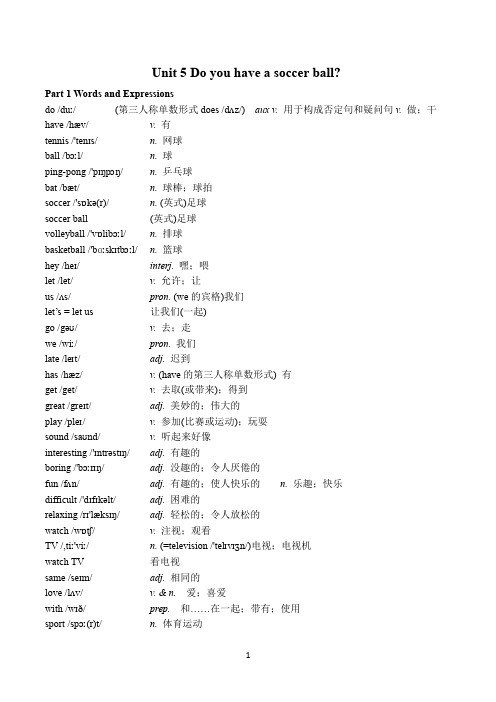
Unit 5 Do you have a soccer ball?Part 1 Words and Expressionsdo /duː/ (第三人称单数形式does /dʌz/) aux v.用于构成否定句和疑问句v.做;干have /hæv/ v.有tennis /'tenɪs/ n. 网球ball /bɔːl/ n.球ping-pong /'pɪŋpɔŋ/ n. 乒乓球bat /bæt/ n. 球棒;球拍soccer /'sɒkə(r)/ n. (英式)足球soccer ball (英式)足球volleyball /'vɒlibɔːl/ n.排球basketball /'bɑːskɪtbɔːl/ n.篮球hey /heɪ/ interj.嘿;喂let /let/ v. 允许;让us /ʌs/ pron. (we的宾格)我们let’s = let us 让我们(一起)go /gəʊ/ v.去;走we /wiː/ pron.我们late /leɪt/ adj. 迟到has /hæz/ v. (have的第三人称单数形式) 有get /get/ v.去取(或带来);得到great /greɪt/ adj.美妙的;伟大的play /pleɪ/ v. 参加(比赛或运动);玩耍sound /saʊnd/ v.听起来好像interesting /'ɪntrəstɪŋ/ adj.有趣的boring /'bɔːrɪŋ/adj.没趣的;令人厌倦的fun /fʌn/ adj.有趣的;使人快乐的n.乐趣;快乐difficult /'dɪfɪkəlt/ adj. 困难的relaxing /rɪ'læksɪŋ/ adj.轻松的;令人放松的watch /wɒtʃ/ v.注视;观看TV /,tiː'viː/ n. (=television /'telɪvɪʒn/)电视;电视机watch TV看电视same /seɪm/ adj. 相同的love /lʌv/ v. & n. 爱;喜爱with /wɪð/ prep.和……在一起;带有;使用sport /spɔː(r)t/ n. 体育运动them /ðəm/ pron. (they的宾格) 他(她、它)们only /'əʊnli/ adv.只;仅like /laɪk/ v. 喜欢;喜爱easy /'iːzi/ adj.容易的;不费力的after /'ɑːftə(r)/prep. & conj.在……之后class /klɑːs/ n.班级;课classmate /'klɑːsmeɪt/ n.同班同学Bill /bɪl/比尔(男名)Part 2:Texts课文(一)Cindy:Hey, Helen, let’s go! We’re late!Helen: OK.Cindy: Do you have the baseball?Helen: Yes, I do. It’s in my bag.Cindy: And where’s our baseball bat?Helen: Bill has it.Cindy: Oh, yeah. And do you have your jacket?Helen: Oh, no, I don’t. It’s on the chair. Let me get it. Cindy: And your hat, too!Helen: OK, I have my jacket and hat. Let’s go!Structure1. Do you have a baseball?Yes, I do./No, I don’t. I have a volleyball.2. Do you have a ping-pong bat?Yes, I do./No, I don’t. I have a ping-pong ball.3. Does she have a tennis ball?Yes, she does./No, she doesn’t. She has a baseball.4. Does he have a soccer ball?Yes, he does./No. he doesn’t. He has two ping-pong bats. 5. Do they have a basketball?句型:—Do/Does sb. have…?—Yes, sb. do / does.—No, sb. don’t / doesn’t.Write each word in the correct place in the chart.将方框中的单词填入表格中正确的位置。
七年级英语上册Unit5-Do-you-have-a-soccer-ball优秀教案
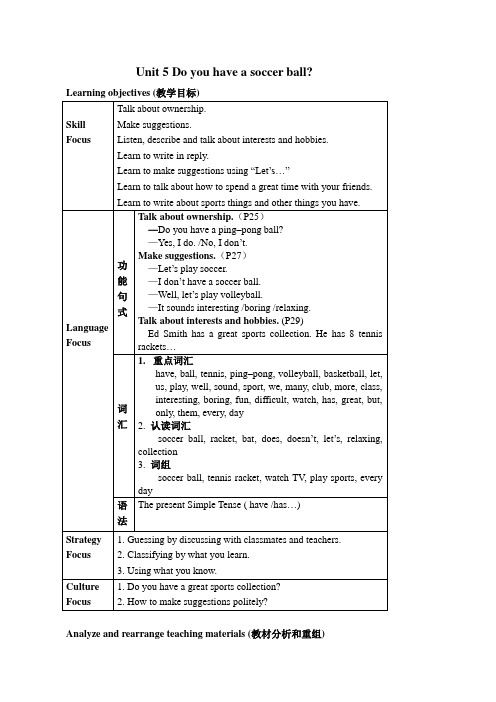
Unit 5 Do you have a soccer ball? Learning objectives (教学目标)Analyze and rearrange teaching materials (教材分析和重组)1. 教材分析本单元以“Do you have a soccer ball?”为话题, 共设计了三个部分的内容。
Section A该部分有4个模块:第一模块围绕“Do you have a soccer ball?”这一话题展开词汇学(1a)、听力(1b)、口语(1c)训练;第二模块继续围绕“Do /Does… have a…?”进行听力(2a-2b)、口语训练(2c);第三模块围绕“Make suggestions.”这一话题展开训练,训练形式为单词填空(3a)和角色表演谈论图画为训练形式(3b);第四模块就“Complete the forms according to the sports club you like.”以结对活动形式进行介绍。
Section B该部分有4个模块:第一模块是词汇的学习(1a)与运用(1b);第二模块仍然围绕(1a-1b) 的词汇进行听力训练(2a-2b)、围绕提建议进行口语训练(2c);第三模块继续围绕“Ownership”这一话题展开有关收藏品阅读(3a), 写作训练(3b-3c);第四模块仍就“Ownership”这一话题以口语训练形式展开全班活动。
Self Check该部分有3个模块:第一模块以填空形式对所学词汇进行训练;第二模块以默写已学过的五个单词的形式对所学的词汇继续巩固复习; 第三模块围绕有关ownership和suggestions对话开展口语训练和写作训练。
教材重组和课时分配Period 1 (Section A: 1a, 1b, 1c) New function presenting Period 2 (Section A: 2a, 2b, 2c, 3a, 3b, 4) PracticePeriod 3 (Section B: 1a, 1b, 2a, 2b, 2c) V ocabulary building Period 4 (Section B: 3a, 3b, 4) Integrating skillsPeriod 5 (Self Check: 1, 2, 3 & Workbook) Self CheckPeriod 6 WritingTeaching procedures and ways (教学过程与方式)Period One New function presentingLanguage goals (语言目标)1. Words & expressions: have, soccer ball, tennis, racket, tennis racket,ping–pong, volleyball, basketball, bat (P25)2.Key sentences: Do you have a ping–pong ball?Yes, I do. No, I don’t. (P25)Ability goals (能力目标)Enable the students to understand and talk about ownership and make suggestions.Emotion & attitude goals (情感和态度目标)Enable the students to form positive attitude toward sports collection and love sports, keep healthy and learn to make suggestions politely. Strategy goals (策略目标)To understand the target language by reading pictures, drawing pictures, countingnumbers, drawing a chart.Culture awareness goals (文化意识目标)People’s attitude toward sports collections is different in English speaking countries.Teaching important points (教学重点)Talk about ownership and make suggestions.Teaching procedures & ways (教学过程和方式)Step 1. Revision and Lead-inAsk one or more students to show their homework.T: In the last unit, I ask you to do a project about filling in the chart because we want to have a ball game. But we don’t know what kind of balls you have. Please ask your classmates in the group what balls he /she has. Then write down the information in the chart. Now who wants to display your project on the blackboard?T: Do you have tennis? S: Yes, I do.Second point to the others in the classroom.T: Does Wang Wei have tennis? S: Yes, he does.Third point to Li Hong in the classroom who has ping–pong ball, but no tennis.T: Do you have tennis?S: No, I don’t.T: Do you have a ping–pong ball?S: Yes, I do.T: Does Li Hong have tennis?Ss: No, she doesn’t.T: Does Li Hong have a ping–pong ball?Ss: Yes, she does.T: Today we are going to learn how to talk about ownership and make suggestions.Step 2. Listing and SpeakingAsk the students to read the picture on Page 25.T: What can you see in the picture?Ss: We can see a ping–pong ball, a ping–pong bat, a tennis racket, a soccer ball, volleyball, a basketball, a TV, a computer game.T: Ask the students to match the words with the things in the picture.Ss: Say, Number 1 is (C), tennis racket. Number 2 is (a), ping–pong ball…After checking the answers in 1a, ask the students to read aloud the new words again and again, ask and answer about them in pairs. And then play the recording again. This time students listen to conversation and circle the words they hear. And then check the answers. Students circle ping–pong bat and computer game.Step 3. Pair workAsk the students to read the example conversation. Have students repeat. And then point to the television in the illustration and substitute that word in the conversation. Have students repeat again. And then ask students to practice the conversation in pairs and remind them to use various objects from the illustration. As students practice, move around the classroom to check progress and help with pronunciation.Ask for more ideas from the students and write their ideas on the blackboard.p hone, cars, pencil case, eraser, pen, book, dictionary, watch, key, notebook, ring, sister , brother, chair, bookcase, CD, video tape, hat, desk, dresser…Show the following to the students and then ask them to practice in pairs.—Do you have a phone?—Yes, I do.—Do you have a CD?—No, I don’t.T: Now work in pairs, make conversations with the newwords in 1a and act it out around the students.Sample conversations:1. S1: Do you have a ping–pong bat?S2: Yes, I do.S1: Do you have a ping–pong bat?S2: No, I don’t.2. S3: Do you have volleyball?S4: Yes, I do.S3: Do you have a basketball?S4: No, I don’t.3. S5: Do you have a tennis racket?S6: Yes, I do.S5: Do you have a TV?S6: No, I don’t.Step 4. Homework1. Ask the students to do more practice as required in 1 c on Page 25.2. Ask the students to prepare the next period. Think about the usage of “Does she /he have…?”Period Two PracticeLanguage goals (语言目标)1. Words & expressions: does, doesn’t, let, us, let’s, play, well, sound,good, sport, we, many, club, more, class (P26)2. Key sentences:—Let’s play volleyball.—That sounds good. (P26)Ability goals (能力目标)Enable the students to make suggestions politely.Emotion & attitude goals (情感和态度目标)Train the Ss to make suggestions politely and take activity part in school sports club and keep healthy.Strategy goals (策略目标)Enable the students to match the problems and worries.Culture awareness goals (文化意识目标)Learn to how to make suggestions politely.Teaching important points (教学重点)Talk about making suggestions.Teaching procedures & ways (教学过程和方式)Step 1. RevisionBefore class, let’s have a revision. First make up a conversation with “Do you have…?”about ownership, and then in threes make up a conversation with “Do you have…? Does she /he have…?”Sample dialogues:1. S1: Do you have a soccer ball? S2: Yes, I do.S1: Do you have a basketball? S2: No, I don’t.2. S1: Do you have a computer game? S2: No, I don’t.S1: Do you have a ping–pong bat? S2: Yes, I do.S3: Does he have a computer game? S1: No, he doesn’t.S3: Does he have a ping–pong bat? S1: Yes, he does.Step 2. Listening PracticePlay the recording for the first time.T: Listen to the tape. You only listen.Play the recording for the second time. Then check the answers.T: You’ll hear the same conversation again in the picture. This time please listen for the names in the pictures, and then number the pictures (1-4).After that ask a few students to say out their answers in 2a.S1: The answers are 3, 1, 4, 2.S2: Number the pictures: 3, 1, 4, 2.Play the recording for the third time.T: You will hear the conversations for the third time. You are to match the people from activity 2a to the balls in the recording for the fourth time and then correct the answers.T: You listen to the tape and write the numbers from the pictures in 2b next to the correct balls.After doing listening, talk about the dialogue about 2b, and then ask some students to say out their answers in 2b.S3: The answers are 3, 2, 1, 4.S4: They are 3, 2, 1, 4.Step 3. Pair workLook at the things in the picture. Ask your partner if he /she has the things in 2c.Ask the students to act out the conversation in pairs.Sample conversations:1. S1: Do you have a dictionary? S2: Yes, I do.S1: Do you have an eraser? S2: No, I don’t.2. S3: Do you have a baseball? S4: No, I don’t.S3: Do you have a football? S4: Yes, I do.3. S5: Does Tom have volleyball? S6: Yes, he does.S6: Does Mike have a pen? S5: No, he doesn’t.Step 4. PracticeLook at 3a, point out the words in the box and then ask a student to read aloud the four words to the class.T: Fill in the blanks with the words from the box alone. I’m sure you’ll fill in the correct answers. And now who’ll tell me the answers? Please hand up if you know the answers. Oh, thank you, --------!S1: The answers are: 1. don’t,2. Let’s,3; have,4. soccer.T: You are right. Thank you. Now let’s practise reading aloud the conversations in pairs and act them out. And then tell the students how to make suggestions politely using “Let’s…!”For example:T: Let’s play ping–pong ball./ Let’s play tennis./ Let’s play volleyball…S: That sounds good.After finishing practising the conversations in 3a, ask the students to make conversations with their partners according to the pictures below in 3b. Ask the students to point to each one and describe each object. Show the students how to use the pairs of pictures as substitutes in the conversation.For example:T: Let’s play basketball.S: I don’t have a basketball.T: Well, let’s play football.S: That sounds good.Ask pairs of students to perform the conversation for the class and tell them how to make suggestions politely in 3b.Step 5. Writing and practiceThis activity gives students a chance to role play a conversation about sports. Students review the language of introductions, and then complete the form, introduce themselves to the coach.T: What sports do you like to play? Who are your favorite sportsmen and sports women? What sports are available at school?S1: I like to play football. My favorite sports man is Liu Xiang. Basketball and volleyball are available at our school.T: Our school has a sports Club with all the sport that you would like to play. If you would like to join the school sports club, please fill in the form with your personal information. When students have completed filling in the form, divide them into pairs.T: Wha t’s your first name? What’s your last name? What sports do you like? Do you like…? What class are you in?S: My first name is Li. My last name is . I like ping–pong ball. I’m in Class 4, Grade 7.Have students role play the conversation between a student and coach. Walk around the class and offer help where necessary.Step 6. SummaryAsk some students to sum up what we have learned key vocabulary and the target languages.Step 7. Today’s homeworkT: First make up dialogues with “ownership and make suggestions” in pairs /in groups. Next class I’ll ask you to act them out. Second, prepare for the next class P 28 (1a, 1b, 2a, 2b, 2c).Period Three New vocabularyLanguage goals (语言目标)1.Words & expressions:interesting, boring, fun, difficult,relaxing, watch, watch TV (P28)2. Key sentences: (1) Let’s play computer games.(2) That sounds interesting. (P28)Ability goals (能力目标)Enable the students to learn to make suggestions politely and responses.Emotion & attitude goals (情感和态度目标)Enable the students to learn to express their feelings about different suggestions.Strategy goals (策略目标)Enable the students to know how to express their feelings aboutdifferent suggestions.Culture awareness goals (文化意识目标)Different countries, different suggestions.Teaching important points (教学重点)Learn to how to express different suggestions and responses. Teaching procedures & ways (教学过程和方式)Step 1. Revision and word studyCheck the homework:T: Last class we asked the students to make up conversationswith “ownership and make suggestions”in pairs /ingroups. Now we’ll ask you to act them out.Point to the five words and ask the students to repeat each one,and then point to the five pictures and ask the students tomatch each picture with one of the words in section B (1a).Ask the students to write the letter of the picture on the linenext to each word.Ask the students to say out the answers. Go around the room,asking students to point to a picture and say the word that goeswith that picture. The answers are: 1. c; 2. d; 3. e; 4. b; 5. a.Step 2. Guessing the wordsThis activity makes students practise using the vocabularywords from this unit. Point to the picture in 1a and reviewthe words.T: Now please draw pictures that show somethinginteresting, boring, fun, difficult or relaxing. Please showyour pictures to some of your classmates. Everyone triesto guess the meaning.Step 3. Listening and word studyBefore playing the recording for the first time, point out thefive words in 1a above and ask a student to read them aloudto the class.Play the recording for the first time in 2a.T: Listen to the tape carefully and remember the fouradjective words you hear.Play the recording for the second time.T: Listen to the conversation and put a checkmark to the leftof each word in 1a that you hear.Ask the two students to say out their answers.Ss: The answers are: a. interesting; b. boring; c. fun;d. difficult;e. relaxing.Step 4. Listening and writingT: I’ll ask a student to read the name of each activity to theclass. And then I’ll play the tape. Listen to the tapecarefully for the first time and remember what Tony saysabout these activities. I’ll play the recording again. Thistime listen to the conversation and write the word in theblank.After listening to the tape for the second time, ask somestudents to read the same example to the class.Ss: The answers are: 1. interesting; 2. difficult; 3. boring; 4. fun.Step 5. Practice and actingBefore asking the two students to read the dialogues, listthese activities on the blackboard: play computer games,play volleyball, watch TV, play basketball.T: I’ll ask the two students to act out the dialogues, talkingabout the activities in 2b.One acts as Jenny, the other acts as Tony, move around theclassroom offering languages support and checkingprogress when the students talk about the activities. Ask afew pairs of students to perform their conversations for theclass.Sample dialogues:1. S1: Let’s play volleyball.S2: That sounds fun.2. S3: Let’s watch TV.S4: That sounds boring.Step 6. Summary1. This class we have learned how to make suggestions andresponses politely. We also have learned how to use somedescription adjectives.2. Prepare for the next class.Step 7. Today’s homework1. Make up dialogues about “Make suggestions and responses”.2. Prepare for the next lesson.Period Four Integrating skillsLanguage goals (语言目标)1. Words & expressions:has, great, collection, but, play sports,only,them, a great sports collection, tennis racket, soccer ball, onTV, everyday (P29)2.Key sentences: (1) Ed Smith has a great collection.(2) But he doesn’t play sports—he only watches them on TV.Ability goals (能力目标)Train the ability of the students about reading and writing.Emotion & attitude goals (情感和态度目标)Enable students to form wide interests and hobbies.Strategy goals (策略目标)Enable students to collect what they like.Culture awareness goals (文化意识目标)Enable students to understand different people have different interests and hobbies.Teaching important & difficult points (教学重点和教学难点)1. The plural form of noun.2. The Present Simple TenseTeaching procedures & ways (教学过程与方式)Step 1. RevisionFirst check the homework, and then ask a few pairs to act out the conversation about: Making suggestions and responses.T: Who can make up a dialogue about making suggestions and responses in pairs?S1: Let’s play football.S2: That sounds fun, but I don’t have a football.S1: Well, do you have a basketball?S2: Yes, I do.S1: Then let’s play basketball.S2: Oh, basketball is so different.S1: OK. Let’s play ping–pong ball.S2: That sounds boring. Let’s play computer game! Do you havea computer?S1: Yes, I do.S2: That sounds interesting.Step 2. ReadingBefore reading this magazine article, ask students to name everything they see in the picture (3a).T: Read the article by yourself, and then circle the vocabulary words that are about sports activities.Give examples such as a stamps collection or a coin collection.T: Please close your books, look at the overhead projector, listen to me carefully, and then fill in the blanks with the sports things in 3a. Please tell the students the answers.S1: 1. tennis racket; 2. basketball; 3. baseball; 4. soccer ball; 5. volleyballT: Y ou’re right. OK. Thank you! Pay attention to the usage of thePresent Simple Tense and the plural form of noun.Explain the usage of the grammar and some key sentences, ask the students to retell the text next class.Step 3. Reading and writingBefore reading this article, ask students to name everything they see in the picture (3b). And then read the article to the class. Ask students to look at the picture and fill in the blanks by themselves. After that, let the students correct the answers in pairs. Ask three students to write their answers on the blackboard. (The answers are: 1. baseball; 2. basketball; 3. tennis rackets; 4. volleyball.)After finishing filling in the blanks, explain the usage of the Present Simple Tense, the plural form of noun and some key words, key sentences. Ask students to recite the text (3b).Step 4. Writing and SpeakingT: After finishing learning the articles about 3a and 3b, now you write about yourself. Talk about your hobbies and interests such as:What sports do you play?What sports things do you have?What other things do you do? And so on.After a while I’ll ask some students to read their stories to the class.S1: I collect coins. I have ten American coins, five Russian coins.S2: I have a great toy cars collection. I have two Chinese toy cars, threeJapanese toy cars, four British toy cars. I play them every day.Step 5. Spoken English and writingNow look at 4 Survey, write “have,you, an alarm clock, do”on the blackboard.T: Please say the words in the correct order to make a question. Come tothe blackboard, Wang Fei.S1: Do you have an alarm clock?T: OK, you’re right. Thank you. Please write a student’s name under thequestion on the blackboard. Who can do it? OK, Yang Fan, please.S2: Li Gang.T: OK, Li Gang, please come to the blackboard. Do you have an alarm clock?Guide him to answer “Yes, I do. /No, I don’t.”S3: Yes, I do.T: Now, please write four questions like this. After that ask students to say other things they might ask. As the students complete the questions, move around the classroom checking progress and offering suggestions as needed, at the same time ask students to move around the room, asking their questions and writing in names. In this way the students learn the target language easily. Step 6. Today’s homework1. Write a story about your /his /her collection.2. Make up dialogue with “Do you have…?”3. Finish off all the exercises on the small blackboard.Period FiveLanguage goals (语言目标)1. Words & expressions: basketball, tennis racket, baseball bat, ping–pong ball,soccer ball, volleyball, interesting, boring, run, difficult, relaxing, TV2. Key sentences: (1) Do you have a ball? Yes, I do.(2) —Let’s play soccer.—That sounds good./It’s boring.Ability goals (能力目标)Train students’ writing abilities.Emotion & attitude goals (情感和态度目标)Learn to talk about ownership and make suggestions.Strategy goals (策略目标)Enable students to form wide interests and hobbies.Culture awareness goals (文化意识目标)Enable students to understand the different countries have different suggestions and hobbies.Teaching important & difficult points (教学重点和教学难点)Learn to how to talk about ownership and make suggestions. Teaching procedures & ways (教学过程与方式)Step 1. RevisionBefore class ask a few students to read aloud the stories about themselves, and then have some pairs act out dialogues about ownership. Also give students three minutes to have a free talk.Step 2. Words checkingThis activity provides a comprehensive review of key vocabulary presented in this unit.T: Now let’s go over key vocabulary in this unit. I speak Chinese, you speak English. First answer my questions one by one, and then answer my questions together. OK let’s begin.有趣的,无聊的,休闲的……篮球,网球球拍……Ss: Interesting , boring, relaxing…T: OK, so much for this. Now take out your English exercises books, write five new words in it, and then share your lists with your groups.Step 3. Reading and writingThis activity focuses on students understanding of the target language in the unit.T: Please read aloud the following sentences in 3a, and then number the sentences to make a conversation that follows the situations in the pictures by yourself.After a while, check the students’ answers. The answers are: 5, 1, 4, 2, 3, 6, 7.After checking the answers, ask the students to act out the dialogue and recite it.T: Now look at the chart on the blackboard with the names of five activities and five words at the top: interesting, boring, fun, difficult, relaxing. And then make up a dialogue talking about ownership and makingAsk two students to act out the dialogue.S1: Let’s play baseball!S2: That sounds interesting, but I don’t have a baseball.S1: …S2: …Step 4. Group workT: The class ball games will be held soon. The students in the class are training recently. Please give suggestions to your group and ask them to train after class.As you make up conversations, please use the drills “Do you have a…? /Yes, I do. /No, I don’t / Let’s… /No, it’s boring.”Step 5. Homework1. Finish off all he exercises in the workbook.2. Talk about your friends’hobbies. (play basketball /soccer ball /ping–pong ball /watch TV /play computer games /play sports every day)Period Six Writing(ppt展示)Teaching Resources (教学资源库)1.语法:(1) 名词复数的构成及读音规律:特别提醒:名词复数的不规则变化是:①只变元音字母,如:man—men, woman —women, foot—feet, policeman—policemen ②单复数形式一样,如:a fish—some fish, a Japanese —some Japanese ③其它变化,如:child—children等。
人教版七年级上册英语Unit5Doyouhaveasoccerball
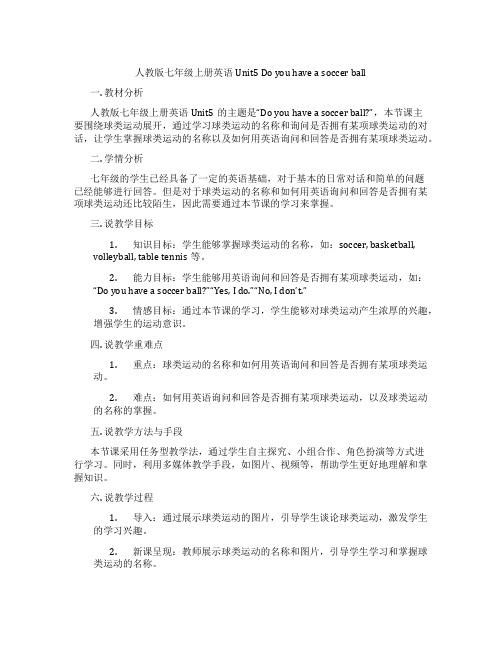
人教版七年级上册英语Unit5 Do you have a soccer ball一. 教材分析人教版七年级上册英语Unit5的主题是“Do you have a soccer ball?”,本节课主要围绕球类运动展开,通过学习球类运动的名称和询问是否拥有某项球类运动的对话,让学生掌握球类运动的名称以及如何用英语询问和回答是否拥有某项球类运动。
二. 学情分析七年级的学生已经具备了一定的英语基础,对于基本的日常对话和简单的问题已经能够进行回答。
但是对于球类运动的名称和如何用英语询问和回答是否拥有某项球类运动还比较陌生,因此需要通过本节课的学习来掌握。
三. 说教学目标1.知识目标:学生能够掌握球类运动的名称,如:soccer, basketball,volleyball, table tennis等。
2.能力目标:学生能够用英语询问和回答是否拥有某项球类运动,如:“Do you have a soccer ball?”“Yes, I do.”“No, I don’t.”3.情感目标:通过本节课的学习,学生能够对球类运动产生浓厚的兴趣,增强学生的运动意识。
四. 说教学重难点1.重点:球类运动的名称和如何用英语询问和回答是否拥有某项球类运动。
2.难点:如何用英语询问和回答是否拥有某项球类运动,以及球类运动的名称的掌握。
五. 说教学方法与手段本节课采用任务型教学法,通过学生自主探究、小组合作、角色扮演等方式进行学习。
同时,利用多媒体教学手段,如图片、视频等,帮助学生更好地理解和掌握知识。
六. 说教学过程1.导入:通过展示球类运动的图片,引导学生谈论球类运动,激发学生的学习兴趣。
2.新课呈现:教师展示球类运动的名称和图片,引导学生学习和掌握球类运动的名称。
3.对话练习:学生两人一组,模拟对话场景,练习如何用英语询问和回答是否拥有某项球类运动。
4.小组活动:学生分成小组,进行角色扮演,模拟真实场景,运用所学知识进行对话。
七年级英语上册Unit5 Do you have a soccer ball知识点全面讲解与练习
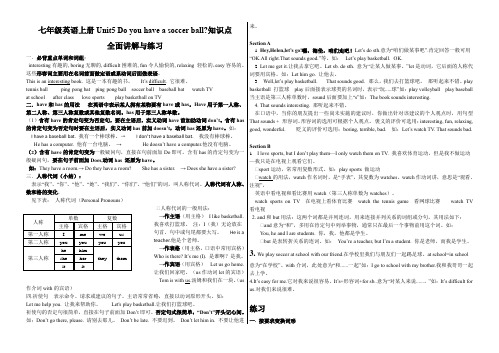
七年级英语上册Unit5 Do you have a soccer ball?知识点全面讲解与练习一.必背重点单词和词组:interesting有趣的, boring无聊的, difficult困难的, fun令人愉快的, relaxing轻松的,easy容易的。
这些形容词主要用在名词前面做定语或系动词后面做表语。
This is an interesting book. 这是一本有趣的书。
It’s difficult. 它很难。
tennis ball ping-pong bat ping-pong ball soccer ball baseball bat watch TVat school after class love sports play basketball on TV二.have和has的用法在英语中表示某人拥有某物要有have或has。
Have用于第一人称、第二人称、第三人称复数或其他复数名词。
has用于第三人称单数。
(1)含有have的肯定句变为否定句,要在主语后,实义动词have前加助动词don’t。
含有has 的肯定句变为否定句时要在主语后,实义动词has前加doesn’t,动词has还原为have。
如:I have a baseball bat. 我有一个棒球棒。
→I don’t have a baseball bat.我没有棒球棒。
He has a computer. 他有一台电脑。
→ He doesn’t have a computer.他没有电脑。
(2)含有have的肯定句变为一般疑问句,直接在句前面加Do即可。
含有has的肯定句变为一般疑问句,要在句子前面加Does,动词has 还原为have。
如:They have a room.→ Do they have a room? She has a sister. → Does she have a sister?三.人称代词(小结):表示“我”、“你”、“他”、“她”、“我们”、“你们”、“他们”的词,叫人称代词。
湖北省武汉市七年级英语上册《Unit 5 Do you have a soccer ball(第
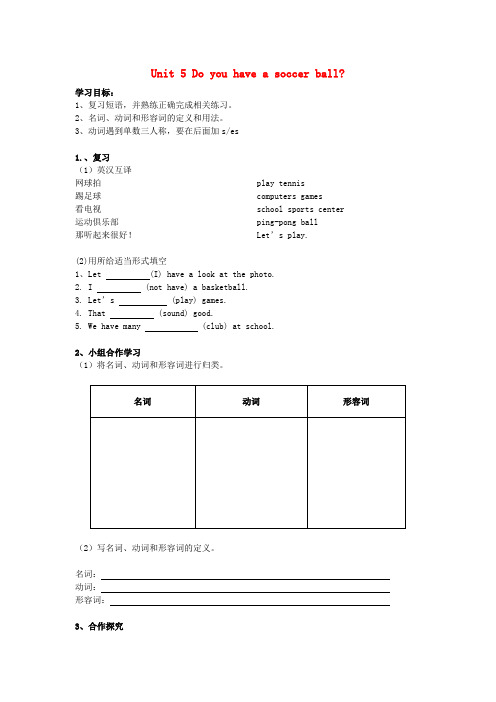
Unit 5 Do you have a soccer ball?学习目标:1、复习短语,并熟练正确完成相关练习。
2、名词、动词和形容词的定义和用法。
3、动词遇到单数三人称,要在后面加s/es1.、复习(1)英汉互译网球拍踢足球看电视运动俱乐部那听起来很好!play tennis computers games school sports center ping-pong ballLet’s play.(2)用所给适当形式填空1、Let (I) have a look at the photo.2. I (not have) a basketball.3. Let’s (play) games.4. That (sound) good.5. We have many (club) at school.2、小组合作学习(1)将名词、动词和形容词进行归类。
(2)写名词、动词和形容词的定义。
名词:动词:形容词:3、合作探究1. Mary is sixty-four.2. He looks young.3. She has two children—one is a son and the other is a daughter.3. My sister only likes soccer.4. My friend Tom plays soccer every day.5. My mother watches it on TV.6. She usually does her homework in the evening.7. Mr. Brown never smokes at home.8. He often buys some fish in the shop.9. Her brother always goes to school by bus.10. The cat really likes catching the mice.观察上面的句型先用红笔划出其中的行为动词(实义动词),再找出变化的规律?想想看。
人教版新目标版七年级英语上册Unit5Doyouhaveasoccerball教案
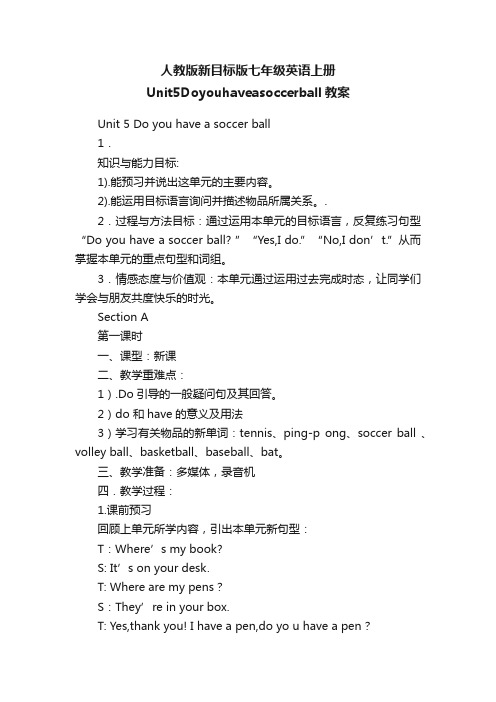
人教版新目标版七年级英语上册Unit5Doyouhaveasoccerball教案Unit 5 Do you have a soccer ball1.知识与能力目标:1).能预习并说出这单元的主要内容。
2).能运用目标语言询问并描述物品所属关系。
.2.过程与方法目标:通过运用本单元的目标语言,反复练习句型“Do you have a soccer ball? ”“Yes,I do.”“No,I don’t.”从而掌握本单元的重点句型和词组。
3.情感态度与价值观:本单元通过运用过去完成时态,让同学们学会与朋友共度快乐的时光。
Section A第一课时一、课型:新课二、教学重难点:1).Do引导的一般疑问句及其回答。
2)do 和have的意义及用法3)学习有关物品的新单词:tennis、ping-p ong、soccer ball 、volley ball、basketball、baseball、bat。
三、教学准备:多媒体,录音机四.教学过程:1.课前预习回顾上单元所学内容,引出本单元新句型:T:Where’s my book?S: It’s on your desk.T: Where are my pens?S:They’re in your box.T: Yes,thank you! I have a pen,do yo u have a pen?S:Yes,I do./No,I don’t.2.正课教授(1)引入①观察25页图片,引入新单词的学习。
②学习do引导的一般疑问句及其肯定回答和否定回答。
have的用法:①have为实义动词,意为“有”,常用句型sb.have/has+sth.表示某人有某物。
当主语为第三人称单数时,have用其第三人称单数形式。
②have还有“吃、喝”的意思,如:have breakfast。
③含有have的句子变否定句要在have前加don’t;含有has的句子变否定句要在h as前加doesn’t,has变为have。
七年级英语上册《Unit 5 Do you have a soccer ball》知识点 (新版)人教版

Unit 5 Do you have a soccer ball?1. Do you have......? Yes, I do. No, I don’t..你有……吗?是的,我有。
不,我没有。
Do they have......? Yes, they do. No, they don’t..Does he have......? Yes, he does. No, he doesn’t.Does she have......? Yes, she does. No, she doesn’t.在一般现在时中,句子的谓语动词若是实义动词,常借助助动词do或does来构成否定句或疑问句。
Does用于主语是第三人称单数的句子中,其他情况用do。
2. do/does1)作助动词,帮助构成一般现在时的否定句或疑问句,无意义。
Do you have a soccer ball? 你有足球吗?I don’t know. 我不知道。
Does Jim have a sister? 吉姆有妹妹吗?What does he like? 他喜欢什么?He doesn’t like English. 他不喜欢英语。
2) 作实义动词,“做,干”。
I do my homework every day. 我每天都做家庭作业。
Bob does his homework every day. 鲍勃每天都做家庭作业。
3) 在一般现在时中,do/does 可用来替代上文出现过的动词,以避免重复。
Do you have a soccer ball? 你有足球吗?Yes, I do. 是的,我有。
(do 代have)Does she have an eraser? Yes, she does.I don’t have a soccer ball, but my brother Alan d oes.我没有足球,但我的哥哥艾伦有。
3.Let’s do sth. “(让)我们做某事吧。
七年级英语上册Unit5Doyouhaveasoccerball教案人教版

Unit 5 Do you have a soccer ball?The First PeriodSection A (1a-2d)Ⅰ.Teaching aims:1.Knowledge aims:(1)Keywords:do,have,tennis,ball,soccer,volleyball,basketball,let,us,go,we,late,has,ge t(2)Key phrases:soccer ball,let’s go,be late(3)Important sentences:A:Do you have a ping-pong bat?B:Yes,I do.A:Do you have a ping-pong ball?B:No,I don’t.2.Ability aims:Talk about different kinds of balls.3.Emotion aims:Make students fall in love with ball sports.II.Important points:Train students’ listening and speaking skills.III.Difficult points:Ask and answer questions using “do” or “does”.IV.Teaching processStep 1 Warming up1.Show a volleyball to the class.T:What’s this in English?Ss:It’s a volleyball.T:Yes,you are right.How do you spell it?Ss:V-O-L-L-E-Y-B-A-L-L,volleyball.Show students other objects,such as basketball,tennis ball,soccerball ,baseball,ping-pongbat...Teach students new words in the same way.2.Work on 1a.①Please look at the picture in 1a.There are some balls in it.Do you know what kindof balls theyare?Match the words with the things in the picture.②Teacher checks the answers.③Look at the key structure.—Do you have a ping-pong bat?—Yes,I do.—Do you have a ping-pong ball?—No,I don’t.Read the words and dialogue after the teacher and then read it together.Step 2 ListeningWork on 1b,2a,2b.1.Play the recording for the first time.Students only listen.2.Play the recording again and ask students to do 1b,2a,2b.3.Check the answers in 1b,2a,2b.Step 3 PairworkWork on 1c.Practice the conversation with your partner. Then ask and answer questions about the things in 1a.A: Do you have a ping-pong bat?B: Yes,I do.A: Do you have a ping-pong ball?B: No,I don’t.Work on 2c.Ask and answer questions about the people in 2a.A:Does Jane have a tennis ball?B:No,she doesn’t.Ask some pairs to act out their conversation.Step 4 Role-playWork on 2d.Let students read the conversation after the teacher,and then practice the conversation with theirpartners.Teacher asks some pairs to act out the conversation in front of the class.Language points1.have的用法(1)have为实义动词,意为“有”,常用句型为sb. have/has +sth.,表示“某人有某物”,当主语为第三人称单数时,have用其单三形式has。
七年级英语上册Unit5Doyouhaveasoccerball教案
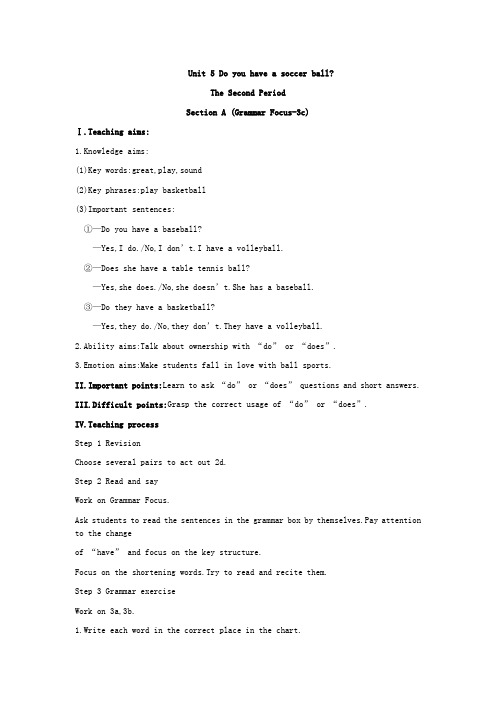
Unit 5 Do you have a soccer ball?The Second PeriodSection A (Grammar Focus-3c)Ⅰ.Teaching aims:1.Knowledge aims:(1)Key words:great,play,sound(2)Key phrases:play basketball(3)Important sentences:①—Do you have a baseball?—Yes,I do./No,I don’t.I have a volleyball.②—Does she have a table tennis ball?—Yes,she does./No,she doesn’t.She has a baseball.③—Do they have a basketball?—Yes,they do./No,they don’t.They have a volleyball.2.Ability aims:Talk about ownership with “do” or “does”.3.Emotion aims:Make students fall in love with ball sports.II.Important points:Learn to ask “do” or “does” questions and short answers.III.Difficult points:Grasp the correct usage of “do” or “does”.IV.Teaching processStep 1 RevisionChoose several pairs to act out 2d.Step 2 Read and sayWork on Grammar Focus.Ask students to read the sentences in the grammar box by themselves.Pay attention to the changeof “have” and focus on the key structure.Focus on the shortening words.Try to read and recite them.Step 3 Grammar exerciseWork on 3a,3b.1.Write each word in the correct place in the chart.Check the answers with students.2.Fill in the blanks with do or does. Then practice the conversations with your partner.Teacher checks the answers with students,and then let students practice the conversations withtheir partner.Then teacher asks some pairs to act out their conversations.Step 4 Group work1.Remember the things in Bob’s room. Then close your books and ask and answer questions witha partner.A:Does Bob have a soccer ball?B:Yes,he does.语法拓展一、一般现在时中have的用法一般现在时的谓语动词可以由be动词(前面已学过)或实义动词来充当。
人教版七年级上册英语Unit 5 Do you have a soccer ball
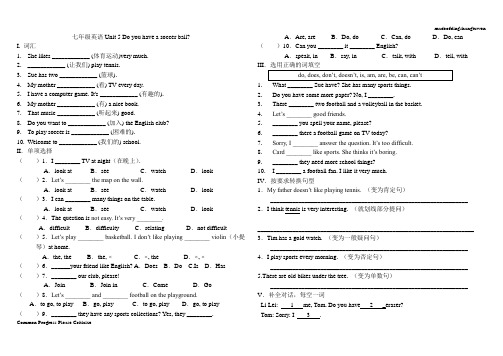
madeofdingshangtuwen七年级英语Unit 5 Do you have a soccer ball?I. 词汇1.She likes ____________ (体育运动)very much.2.____________ (让我们) play tennis.3.Sue has two ____________ (篮球).4.My mother ____________ (看) TV every day.5.I have a computer game. It's ____________ (有趣的).6.My mother ____________ (有) a nice book.7.That music ____________ (听起来) good.8.Do you want to ____________ (加入) the English club?9.To play soccer is ____________ (困难的).10.Welcome to ____________ (我们的) school.II.单项选择()1.I ________ TV at night(在晚上).A.look at B.see C.watch D.look()2.Let’s ________ the map on the wall.A.look at B.see C.watch D.look()3.I can ________ many things on the table.A.look at B.see C.watch D.look()4.The question is not easy. It’s very ________.A.difficult B.difficulty C.relating D.not difficult()5.Let’s play ________ basketball. I don’t like playing ________ violin(小提琴)at home.A.the, the B.the, ×C.×, the D.×, ×()6.______your friend like English? A.Does B.Do C.Is D.Has()7.________ our club, please!A.Join B.Join in C.Come D.Go()8.Let’s ________ and ________ football on the playground.A.to go, to play B.go, play C.to go, play D.go, to play()9.________ they have any sports collections? Yes, they ________.A.Are, are B.Do, do C.Can, do D.Do, can ()10.Can you ________ it ________ English?A.speak, in B.say, in C.talk, with D.tell, with III .选用正确的词填空do, does, don’t, doesn’t, is, am, are, be, can, can’t1.What ________ Sue have? She has many sports things.2.Do you have some more paper? No, I ________.3.There ________ two football and a volleyball in the basket.4.Let’s ________ good friends.5.________ you spell your name, please?6.________ there a football game on TV today?7.Sorry, I ________ answer the question. It’s too difficult.8.Card ________ like sports. She thinks it’s boring.9.________ they need more school things?10.I ________ a football fan. I like it very much.IV.按要求转换句型1.My father doesn’t like playing tennis. (变为肯定句)_______________________________________________________________ 2.I think tennis is very interesting. (就划线部分提问)_____________________________________________________________________ 3.Tim has a gold watch. (变为一般疑问句)_______________________________________________________________ 4.I play sports every morning. (变为否定句)_______________________________________________________________ 5.There are old bikes under the tree. (变为单数句)_______________________________________________________________ V.补全对话,每空一词Li Lei: 1 me, Tom. Do you have 2 _eraser?Tom: Sorry. I 3 .madeofdingshangtuwenLi Lei: Do you think David 4 one?Tom: I think 5 . You can ask 6 .,Li Lei:David, may I have 7 eraser, please?David: Sorry, Lucy has 8 eraser. Please go and ask her.Li Lei:Excuse me, Lucy. May I 9 David’s eraser?Lucy: Certainly. Here you are.But you must give it back to him soon.Li Lei: OK. 10 very much.1.________ 2.________ 3.________ 4.________ 5.________6.________ 7.________ 8.________ 9.________ 10.________VI.完形填空I have a good friend. 1 name is Mary. She 2 from America. She is3 China with her father and mother. She can4 a little Chinese. She is in the No.15 Middle School in Shanghai. Her father and mother 5 . They are in the No. 50 Middle School. Mary is a good student. She 6 school five days a week. She 7 up early. She 8 to be late. She often goes to school very early. But today she got up late. So she got to the classroom at seven thirty. 9 there weren’t any students in the classroom. She wasn’t late. She was still early. It was Saturday today. The students were all 10 . (New words:got是get的过去式was是is的过去式were是are 的过去式).()1.A.She B.He C.Her D.His()2.A.come B.comes C.are D, go()3.A.at B.in C.of D.from()4.A.say B.tell C.talk D.speak()5.A.is teacher B.are teachers C.is doctor D.are doctors()6.A.is go B.is C.go to D.goes to()7.A.like getting B.likes getting C.like get D.likes get()8.A.like B.likes C.don’t like D.doesn’t like()9.A.And B.But C.So D.Too ()10.A.at home B.in home C.at school D. in school VII.阅读理解(A)Amy: Hey, Jim! Do you have a dictionary (字典)?Jim: Yes, I do.Amy: May I borrow it?Jim: Sure. Here you are.Amy: Oh, I want a Chinese-English dictionary. Yours is an English-Chinese one. Jim: Sorry. I have only one. Ask Linda. I think she may have one.Amy: OK. Thanks.Amy: Hi, Linda. Do you have a Chinese-English dictionary?Linda: Yes, I do.Amy: May I borrow it, please?Linda: Sure. But please give it back to me tomorrow.Amy: OK, I will.According to the passage, chose true(T) or false (F).1. Jim doesn’t have a dictionary.2. Jim borrow a dictionary from Amy.3. Linda has a Chinese-English dictionary.4. Amy borrows the dictionary from Linda.5. Amy will give it back tomorrow.(B)Name Have/ has Don’t (doesn’t) havePaul A baseball, a soccer ball A tennis racketGina A backpack, a watch A baseball batJim A basketball, a TV A pair of baseball glovesKate An alarm clock A watch, a ballTommy A math book, CDs A video cassettemadeofdingshangtuwenChose best answer according to above information.1. Gina has _____, but she doesn’t have ______.A. a watch; a ballB. a clock; a watchC. a clock; a ballD. a watch; a baseball bat2. Kate has _____, but she doesn’t have _____.A. a watch; a ballB. a ball; a clockC. a book; CDsD. a clock; a watch3. Paul and Jim have ______.A. booksB. CDsC. ballsD. tennis rackets4. Tommy has a ______ and some ______A. a math book; a ballB. a math book; CDsC. video cassette; CDsD. a clock; a watchKys:I. 1. sports 2. Let's 3. basketballs 4. watches 5. interesting6. has7. sounds8. join9. difficult10. ourII.单项选择.1.C(watch TV看电视)2.A(look at“看……”,表示动作)3.B(see“看见”,表示结果)4.A(difficult形容词,“困难的”)5.C(表示球类运动的名词前不用冠词,表示乐器的名词前用定冠词the)6.A(your friend是单数名词作主语)7.A(join表示“加入”的意思)8.B(let’s后接动词原形)9.B(do为助动词,用于行为动词构成疑问句)10.B(say表示说的具体内容,in English用英语III.选用正确的词填空1.does 2.don’t 3.are 4.be 5.Can 6.Is 7.can’t 8.doesn’t 9.Do10.amIV.1. My father likes playing tennis.2. What sport do you think is very interesting?3. Does Tim have a gold watch? 或Has Tim a gold watch?4. I don’t play sports every morning.5. There is an old bike under the tree.V.1.Excuse 2.an 3.do n’t 4.has 5.so 6.him 7.your 8.my 9.have 10.ThanksVI. 1.C(her“她的”,是物主代词)2.B(come from来自于某地,主语为she,谓语动词应用第三人称单数)3.B(in China在中国)4.D(speak表示“讲某语言”)5.B(由下一句可知)6.D(go to school上学,主语为she,go应用goes)7.B(like doing sth喜欢做某事)8.D(主语为she,谓语否定为doesn’t like)9.B(but表示转折关系)10.A(at home“在家里”的意思)VII (A)FFTTT(B)DDCB。
七年级上册英语《Unit 5 do you have a soccer ball》同步卷和答案详解

人教新版七年级上册《Unit5Do you have a soccer ball?》同步练习卷(2)一、翻译:1.你有足球吗?Do you have?2.让我们不要迟到。
Let's.3.放学后,我喜欢和同学一起打篮球。
I like after school.4.我擅长踢足球。
I'm good.5.我爸爸只在电视上看篮球比赛。
My father only TV.6.我的爷爷对这部有趣且令人放松的电影很感兴趣。
My grandfather is interested in movie.7.莱奥梅西四岁时开始踢足球因为他踢球很开心。
Leo Messi started playing football at the age of four because he had much fun. 8.莉莉总是上学迟到。
Lily school.9.只有这两个男孩住在同一个城市。
live in the same city.10.他不喜欢吃水果但我喜欢。
He doesn't like eating apples but.二.补全对话11.A:Hello,long time no see.(1)?B:I'm fine,thanks.(2)?A:I'm OK.(3)?B:Yes,I like to play baseball very much.A:Me,too.I want to play baseball with my friends tomorrow.(4)?B:Yes.When and where shall we meet?A:Let's meet at8:00at the school gate.B:See you there.A:(5).三.短文填空12.Bob likes(1)(play)soccer after class.And he always plays it alone(独自地).TodayMiss White(2)(see)Bob(3)(play)in the playground. "Hi,Bob.What sport do you like?"Miss White(4)(ask)."Soccer,of course.I have3soccer(5)(ball).One is here,the other is at(6)(I)home,"Bob answers."I see.Why do you play it alone?You can play it with your classmates.""But it's my ball.I don't want(7)(play)it with others.""Is it(8)(interest)to play alone?"Miss White asks."No,it isn't.And it's a little boring,"Bob looks at his ball and(9)(say)."Share(分享)your ball with your classmates.I'm sure you will have fun.Then Bob(10)(do)as(按照)Miss White says.And he really has a great time.He finds that sharing is fun.四.选择填空:13.I have____basketball.Let's play_____basketball.()A.an;/B.a;the C.the;a D.a;/14.Ted has eight ping﹣pong balls,______he doesn't play ping﹣pong.()A.and B.but C.so D.only15.Let's____for a walk,shall we?()A.to go B.going C.go D.gone16.I____a volleyball and he____a tennis ball.()A.have;have B.have;has C.has;have D.has;has 17.We play soccer_____our friends after school.()A.at B.with C.in D.after 18.The girl______every Sunday.()A.play sport B.plays sportC.play sports D.plays sports19.一______is my computer game?一I think it's on the table.()A.What B.How C.Who D.Where20.______are good friends.()A.I and Bob B.Bob with I C.Bob and I D.I with Bob 21.My brother and my cousin_________school.()A.go the same B.go to the sameC.go to same D.go same22.﹣Let's play tennis.﹣________.()A.Thank you B.Yes,pleaseC.That sounds good D.You're welcome五..完形填空23.Hi,I'm Bob.I have(1)good friends.They're Gina,Tom and Jack.Gina is a nice girl.She likes reading.You can see(2)everywhere in her room.Tom likes (3).He has two baseballs,five(4)and three basketballs.He(5)sports with his classmates every day.He thinks it's(6).Jack likes sports,too.(7)he doesn't play sports.He only(8)them on TV.I don't like sports.I think it's boring.I (9)a computer.I like playing games on it.But my mother doesn't(10)me do that on school days.I can only play computer games on weekends(周末).(1)A.two B.three C.four D.five(2)A.books B.keys C.jackets D.pictures(3)A.purple B.numbers C.English D.sports(4)A.rulers B.oranges C.volleyballs puters(5)A.plays B.asks C.knows D.calls(6)A.boring B.difficult C.interesting D.tidy(7)A.And B.But C.Too D.Only(8)A.sees B.meets C.says D.watches(9)A.find B.like C.have D.play(10)A.ask B.let C.call D.say一.翻译24.他妹妹在同一个学校但是在不同的班级。
- 1、下载文档前请自行甄别文档内容的完整性,平台不提供额外的编辑、内容补充、找答案等附加服务。
- 2、"仅部分预览"的文档,不可在线预览部分如存在完整性等问题,可反馈申请退款(可完整预览的文档不适用该条件!)。
- 3、如文档侵犯您的权益,请联系客服反馈,我们会尽快为您处理(人工客服工作时间:9:00-18:30)。
Thank you!
Language points
在句中可作定语或表语。相当于hard,反义词为easy。
That's a difficult question.=That question is difficult/isn't easy.
5.watch的用法 (1)watch用作动词,意为“观看;注视”,常用短语:watch TV看电视
Unit 5 Do you have a soccer ball?
The Third Period Section B (1a-1d)
Warming up
【Guessing game】
Guess what the picture mean.
1a Match the words with the pictures.
relaxing —That sounds __________( 令人放松的).
5.I think ping-pong is __________( 使人快乐的). fun
二、单项选择。 1.Bob has an ________ book. A A.interesting B.fun B.watch TV C.good C.to watch TV
2.Let Jim ________. B
A.watches TV 3.—Let's play a game. —________ C
A.Yes,we do.
A.boring A.and
B.No,we don't.
B.relaxing B.but
C.That sounds good.
C.interesting C.or
play computer games
interesting
difficult
play volleyball
watch TV
___________ boring
fun ___________
play basketball
___________
1d You are Paul. Your partner is Paul's friend Jenny. Talk about the activities in 1c.
4.—Let's play basketball.
—Oh,no,that sounds ________. C
5.Peter likes sports very much ________ he doesn't like football. B
Homework
1.Recite the new words. 2.Practice the conversation in 1c.
1. interesting ______ c √ 2. boring ______ d 3. fun ______ e 4. difficult ______ b 5. relaxing ______ a
1b Listen and check (√) the description words you hear in 1a.
Language points
1.interesting与boring
interesting adj.有趣的;boring adj.无趣的,无聊的。两者互为反义词。 2.relaxing 令人放松的,轻松的
interesting,boring,relaxing都是由动词加-ing构成的形容词。可用来作定语修
饰某物或某事,或用来作表语描述某物或某事,但一般不修饰人或描述人。令人愉快的”,fun还可以作为名词,意为
“乐趣;趣事;玩笑”,是不可数名词,常见的短语有: have fun玩得高兴 have fun doing sth.做某事感到愉快
4.difficult苦难的
Exercise
一、根据汉语提示补全单词。 1.—Let's __________( 看) TV! watch boring —That sounds __________( 没趣的).
2.It's a __________( 困难的) question(问题). difficult
interesting 有趣的). 3.Playing soccer is __________( 4.—Let's play computer games!
1. interesting ______ c √
2. boring ______ d √
3. fun ______ e √
5. relaxing ______ a
4. difficult ______ b √
1c Listen again. What does Paul say about these activities? Choose a word from 1a to fill in each blank.
(2)watch用作名词,意为“手表”,可数名词,其复数形式为watches
。 (3)watch用作动词时后面可直接接宾语,表示长时间地观看某一活动的
场面;而look后面不直接跟宾语,通常与介词at连用,也可单独使用,表示
引起别人的注意。 —Would you like to play? —No,thanks.
